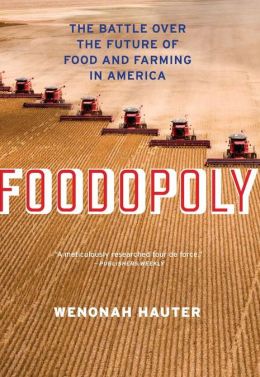The Monsanto Protection Act? A Debate on Controversial New Measure Over Genetically Modified Crops
President Obama outraged food activists last week when he signed into law a spending bill with a controversial rider that critics have dubbed the "Monsanto Protection Act." The rider says the government must allow the planting of genetically modified crops even if courts rule they pose health risks. The measure has galvanized the U.S. food justice movement, which is now preparing for its next fight when the provision expires in six months. We host a discussion on the "Monsanto Protection Act" and the safety of genetically modified foods with two guests: Gregory Jaffe, director of the Biotechnology Project at the Center for Science in the Public Interest, a nonprofit consumer advocacy organization that addresses food and nutrition issues; and Wenonah Hauter, executive director of Food & Water Watch and author of the book, "Foodopoly: The Battle Over the Future of Food and Farming in America." On Wednesday, Hauter’s group is releasing a major new report called "Monsanto: A Corporate Profile."
To Watch the Episode

Foodopoly: The Battle Over the Future of Food and Farming in America from Monsanto to Wal-Mart
Wenonah Hauter, the executive director of Food & Water Watch, joins us to discuss her new book, "Foodopoly: The Battle Over the Future of Food and Farming in America." Hauter tackles the corporations behind the meat, vegetables, grains and milk consumed by millions every day — including some of the most popular organic brands. "Foodopoly" details how a handful of large corporations control the nation’s food production in ways that limit how small farms operate and how ordinary people make choices in grocery stores. And in the wake of the recently passed provision dubbed by critics as the "Monsanto Protection Act," Hauter also discusses the new report by Food & Water Watch, "Monsanto: A Corporate Profile."
To Watch the Episode
Background on the corporation Monsanto:
There’s nothing they are leaving untouched: the mustard, the okra, the bringe oil, the rice, the cauliflower. Once they have established the norm: that seed can be owned as their property, royalties can be collected. We will depend on them for every seed we grow of every crop we grow. If they control seed, they control food, they know it – it’s strategic. It’s more powerful than bombs. It’s more powerful than guns. This is the best way to control the populations of the world. The story starts in the White House, where Monsanto often got its way by exerting disproportionate influence over policymakers via the “revolving door”. One example is Michael Taylor, who worked for Monsanto as an attorney before being appointed as deputy commissioner of the US Food and Drug Administration (FDA) in 1991. While at the FDA, the authority that deals with all US food approvals, Taylor made crucial decisions that led to the approval of GE foods and crops. Then he returned to Monsanto, becoming the company’s vice president for public policy.
Thanks to these intimate links between Monsanto and government agencies, the US adopted GE foods and crops without proper testing, without consumer labeling and in spite of serious questions hanging over their safety. Not coincidentally, Monsanto supplies 90 percent of the GE seeds used by the US market. Monsanto’s long arm stretched so far that, in the early nineties, the US Food and Drugs Agency even ignored warnings of their own scientists, who were cautioning that GE crops could cause negative health effects. Other tactics the company uses to stifle concerns about their products include misleading advertising, bribery and concealing scientific evidence.
World According to Monsanto from Hyperion on Vimeo.
No comments:
Post a Comment